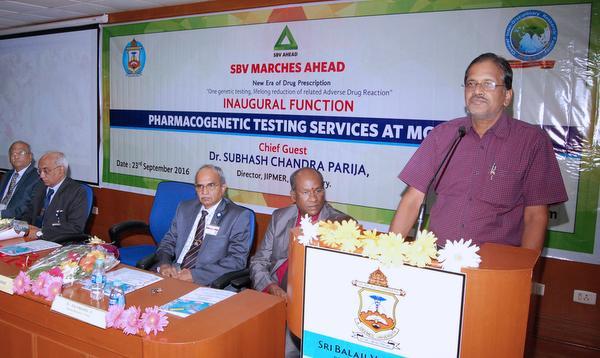The Mahatma Gandhi Medical College and Research Institute (MGMCRI) on Friday launched pharmacogenomic testing services that marks an important step towards providing personalised care based on the genetic profile of patients.
According to doctors, the genetic make-up of a person accounts for 60-70 per cent of variations in the manner and the measure to which the body responds to medication. Pharmacogenomic testing of an individual provides important genetic information that can be used to customise therapy.
The test results provide doctor vital clues about the patient’s capacity to handle certain drugs. Based on this, the physician can then choose an appropriate drug and its dosage that maximises safety and efficacy besides bringing down costs.
The approach raises hope for patients in a far from satisfactory scenario of drug therapy where many drugs do not work as expected. For instance, in patients with heart disease, around 30 per cent treated with statins, 35 per cent treated with beta-blockers and about half the patients put on tricyclic antidepressants show no response to therapy. Moreover, some patients may develop drug toxicity even at recommended doses. “The key is that pharmacogenic testing provides predictive values that help doctors choose a drug within a class likely to be most effective and least hazardous in terms of side effects before patients are started on a regimen of medicines,” said Dr. Adithan C., professor of pharmacology and Director of Central Inter-Disciplinary Research Facility, MGMCRI.
The pharmacogenomic testing service is open to patients suffering from cardiovascular diseases, diabetes, asthma, psychiatric disorders, cancer, infections or inflammatory diseases. Experts believe that around 70 per cent of adverse drug reactions could be related to genetic profile that concern drug-handling enzymes of a patient, which can be predicted and prevented by a suitable pharmacogenomics test. Based on the pharmacogenomic tests, doctors expect to learn more about the likely drugs and dosage that could achieve the most effective drug response.
“Another benefit is that even perfectly healthy people can also utilise this service during master health check-ups at hospital, so that they can have a pharmacogenomic profile report which is valid throughout their life, Dr. Adithan said.
Dr. S.C. Parija, director of JIPMER, who inaugurated the facility. Prof. K.R. Sethuraman, the Vice-Chancellor of Sri Balaji Vidyapeeth University which administrates the MGMCRI, Prof. N. Ananthakrishnan, Dean of Research and Allied Health Sciences and Prof. M. Ravishankar, Dean, Faculty Medicine, MGMCRI also participated.


